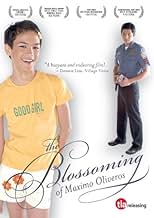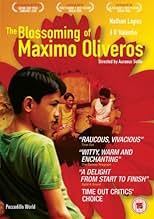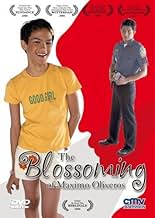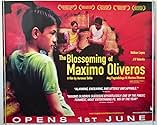IMDb RATING
7.0/10
1.7K
YOUR RATING
A young boy falls in love with a handsome policeman who is investigating his family's criminal activities.A young boy falls in love with a handsome policeman who is investigating his family's criminal activities.A young boy falls in love with a handsome policeman who is investigating his family's criminal activities.
- Awards
- 24 wins & 28 nominations total
JR Valentin
- Victor Perez
- (as J.R. Valentin)
Jett Desalesa
- Leslie - Maxi's friend
- (as Sir Jett Desalesa)
- Director
- Writer
- All cast & crew
- Production, box office & more at IMDbPro
Featured reviews
Absolutely delightful film, its story centering around Maxi (Nathan Lopez), a beguiling 12 year old boy who wants to be a girl, and his various flirtations, including an unlikely one with a rookie cop on the neighborhood beat. Maxi's Dad and two older brothers are criminal lowlifes capable of very bad deeds, including murder, but they are entirely devoted to Maxi, who cooks and keeps house for them (Mom died a few years before). The feeling is mutual: as Maxi says, there may be a lot of crooked people around, but he's only got one Dad.
The film is chock full of arresting street scenes in metropolitan Manila, and intriguing tensions among the principals. It is most refreshing to see loving, tender feelings binding a marginal family together, rather than the usual melodramatic dysphoria that infects, but does not inform, many movies about the underclass. (This year's "Quinceañera" is another film that plays up the positive aspects of family life in L.A.'s Echo Park Mexican-American barrio.) An exotic, spellbinding, bounteous bouquet of a film. Won several awards at the Berlin and Cinemalaya Film Festivals, among others, and was nominated for the Grand Jury Award this year at Sundance. (In Filipino, Tagalog & English) My grades: 8.5/10, A- (Seen on 11/21/06)
The film is chock full of arresting street scenes in metropolitan Manila, and intriguing tensions among the principals. It is most refreshing to see loving, tender feelings binding a marginal family together, rather than the usual melodramatic dysphoria that infects, but does not inform, many movies about the underclass. (This year's "Quinceañera" is another film that plays up the positive aspects of family life in L.A.'s Echo Park Mexican-American barrio.) An exotic, spellbinding, bounteous bouquet of a film. Won several awards at the Berlin and Cinemalaya Film Festivals, among others, and was nominated for the Grand Jury Award this year at Sundance. (In Filipino, Tagalog & English) My grades: 8.5/10, A- (Seen on 11/21/06)
This film tells the story of a young effeminate boy from a criminal family, who falls for a hunky local policeman in a deprived part of Manila.
A young transvestite boy, possibly transgendered as well,falling in love with a policeman. And it is hinted that the policeman has equal feelings towards him too! I would have thought such a topic should be taboo. The family is so accepting of Maximos that I find it really touching. I am quite in awe that the Filipino society is so accepting of the gay and transgender people.
As for the film, they use loads of natural lighting almost exclusively, so scenes are too dark most of the time. There is even a scene when the family watches TV without lights on! And they did not use a wide enough lens to film scenes in the house either. But these are only minor issues. The main thing is that the story itself is beautiful and brutal at the same time. "The Blossoming of Maximo Oliveros" is quite an eye opener for me.
A young transvestite boy, possibly transgendered as well,falling in love with a policeman. And it is hinted that the policeman has equal feelings towards him too! I would have thought such a topic should be taboo. The family is so accepting of Maximos that I find it really touching. I am quite in awe that the Filipino society is so accepting of the gay and transgender people.
As for the film, they use loads of natural lighting almost exclusively, so scenes are too dark most of the time. There is even a scene when the family watches TV without lights on! And they did not use a wide enough lens to film scenes in the house either. But these are only minor issues. The main thing is that the story itself is beautiful and brutal at the same time. "The Blossoming of Maximo Oliveros" is quite an eye opener for me.
One can seldom discuss gay Filipino films without mentioning the Lino Brocka classic, "Macho Dancer". For a long time the film lorded over all the others in gay filmdom (or is it 'film gaydom'?). Sure there were competent ones like "Aishite Masu" and "Markova: Comfort Gay" but they were never thisclose to "Macho". Could "Ang Pagdadalaga ni Maximo Oliveros" finally be the one true contender for the throne?
Director Aureus Solito and writer Michiko Yamamoto have crafted a very likable coming of age story. The treatment of Maximo Oliveros' (Nathan Lopez) homosexuality is unique and refreshing for it is never questioned nor made an issue, just a fact as true as the sky is blue. It's a huge credit to the filmmakers for not resorting to easy laughs at the expense of gay characters. Camp is absolutely present but it's never overdone. In fact, I think one of the main reasons why the film works so well is because the whole film isn't overdone. The filmmakers know when to pull back just before a scene turns mushy or heavyhanded. Even something as elaborate as the mini-pageant scene is cut long enough to avoid unnecessary melodrama.
One of the film's most interesting aspects for a lot of viewers is the seemingly astonishing possibility that an effeminate homosexual can exist relatively peacefully in the slums, aka Hoodlum Central. Although I haven't seen this myself, I am convinced that cultural mores make this scenario very possible. Despite the influence of homophobic Roman Catholicism, the general mood in the country is situated somewhere between amusement, acceptance, and tolerance (though not immune to occasional spurts of homophobia). Let us not forget that pre-Spanish Philippine culture respected the 'babaylan', a gay priest(ess) of sorts.
The homoerotic love angle is beautifully handled, in my opinion. To start with, the leads are perfect. Lopez carries the film as Maximo while JR Valentin as the cop is hunky yet brotherly, respectable as necessary but not too antiseptic. You get a sense of hero worship, excessive caring, and strong attraction from the side of Maximo while from the other side you see a fraternal sense of caring, naivete, and a culturally-imbibed politeness that supersedes any possible homophobia. There's also a delicious hint of ambiguity in his sexuality. There are a number of memorable scenes between the two, but a brief, well-handled, but highly erotic one (which, under a weaker filmmaker, could've easily bordered on pedophilia considering Maximo's age) and the emotionally satisfying ending stand out the most.
Despite the fact that Maximo Oliveros is unapologetically gay the film isn't strictly gay-themed unless you consider puppy love, unrequited love, familial obligations, and economic struggles as such.
It was a proud moment to watch a Filipino film in the prestigious Lincoln Center New Films/New Directors series in New York City. It was icing on the cake to see someone from the Univ. of the Philippines do good, in the gay arena, no less. "As good as Hollywood films"? I say better. When did Hollywood ever show us a coming of age story with a gay lead character?
Director Aureus Solito and writer Michiko Yamamoto have crafted a very likable coming of age story. The treatment of Maximo Oliveros' (Nathan Lopez) homosexuality is unique and refreshing for it is never questioned nor made an issue, just a fact as true as the sky is blue. It's a huge credit to the filmmakers for not resorting to easy laughs at the expense of gay characters. Camp is absolutely present but it's never overdone. In fact, I think one of the main reasons why the film works so well is because the whole film isn't overdone. The filmmakers know when to pull back just before a scene turns mushy or heavyhanded. Even something as elaborate as the mini-pageant scene is cut long enough to avoid unnecessary melodrama.
One of the film's most interesting aspects for a lot of viewers is the seemingly astonishing possibility that an effeminate homosexual can exist relatively peacefully in the slums, aka Hoodlum Central. Although I haven't seen this myself, I am convinced that cultural mores make this scenario very possible. Despite the influence of homophobic Roman Catholicism, the general mood in the country is situated somewhere between amusement, acceptance, and tolerance (though not immune to occasional spurts of homophobia). Let us not forget that pre-Spanish Philippine culture respected the 'babaylan', a gay priest(ess) of sorts.
The homoerotic love angle is beautifully handled, in my opinion. To start with, the leads are perfect. Lopez carries the film as Maximo while JR Valentin as the cop is hunky yet brotherly, respectable as necessary but not too antiseptic. You get a sense of hero worship, excessive caring, and strong attraction from the side of Maximo while from the other side you see a fraternal sense of caring, naivete, and a culturally-imbibed politeness that supersedes any possible homophobia. There's also a delicious hint of ambiguity in his sexuality. There are a number of memorable scenes between the two, but a brief, well-handled, but highly erotic one (which, under a weaker filmmaker, could've easily bordered on pedophilia considering Maximo's age) and the emotionally satisfying ending stand out the most.
Despite the fact that Maximo Oliveros is unapologetically gay the film isn't strictly gay-themed unless you consider puppy love, unrequited love, familial obligations, and economic struggles as such.
It was a proud moment to watch a Filipino film in the prestigious Lincoln Center New Films/New Directors series in New York City. It was icing on the cake to see someone from the Univ. of the Philippines do good, in the gay arena, no less. "As good as Hollywood films"? I say better. When did Hollywood ever show us a coming of age story with a gay lead character?
Just by watching this film, one can understand inside-out about what's going on in a so-called developing country. All the odds. All the blurry lines. And the great parallel of morality and survivability. This film tells a life story well beyond homosexuality and human attraction, as indicated in the camouflage. Maximo or Maxi represents every soul on earth, who needs time, and perhaps a tragedy, to comprehend the life bestowed on him by others, and another life he may be given a chance to choose. His criminal but ultimately decent family is on one side, and the naively honest and devilishly handsome police officer on the other. And, to cry out loud, he is only 12 years old, living in a slum area and without a mother. Forcing him to choose is cruel. I myself am from Thailand. Not so different from the Philippines portrayed excellently here. I think I can relate very well to the sense of trapping one may feel, having born into a brothel of life like that. I dare an inexperienced westerner to predict the film plot, and how it might end. I do not think you can figure out one move to another. This film is honest, with the story well-told and incredibly fair. It should be nominated for major film awards on behalf of ASEAN, as opposed to the Philippines alone, as it tells an ASEAN story, except for Singapore, as few films can. Maximo walks past the charming Victor on his way to re-enter school. Believe it or not, it is indeed a hard decision to make, in a society less than fair and democratic. He is indeed blossoming.
Regardless the controversial topic and my non-knowledge of the reality of those events (for example, volume of corruption within police and acceptance of gays in the Phillippines), as for a film as such, it was skilfully accomplished: good/great performances by major actors, versatile direction and appropriate choice of music made Ang pagdadalaga ni Maximo Oliveros a smooth watch.
Due to limited space and time, however, the film had several documentary elements, and several events happening in the dark did not allow to follow them carefully (perhaps by virtue of modest technology used?). Thus, not a total contentment for me, but definitely a distinguishing and challenging creation to be screened in various festivals.
Due to limited space and time, however, the film had several documentary elements, and several events happening in the dark did not allow to follow them carefully (perhaps by virtue of modest technology used?). Thus, not a total contentment for me, but definitely a distinguishing and challenging creation to be screened in various festivals.
Did you know
- TriviaJoey Pepe Smith who plays the piano man being teased by the kids is the one who scored the film.
- ConnectionsReferenced in Ako ang simula: The ABS-CBN News and Current Affairs Yearend Special (2006)
- SoundtracksMy Country, My Philippines
Written and Performed by Yoyoy Villame
- How long is The Blossoming of Maximo Oliveros?Powered by Alexa
Details
- Release date
- Country of origin
- Official sites
- Languages
- Also known as
- The Blossoming of Maximo Oliveros
- Filming locations
- Production companies
- See more company credits at IMDbPro
Box office
- Gross US & Canada
- $28,041
- Opening weekend US & Canada
- $6,690
- Sep 24, 2006
- Gross worldwide
- $38,691
- Runtime
- 1h 40m(100 min)
- Color
Contribute to this page
Suggest an edit or add missing content

























